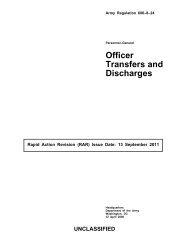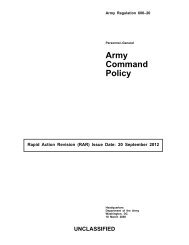Patient Administration - Army Publishing Directorate - U.S. Army
Patient Administration - Army Publishing Directorate - U.S. Army
Patient Administration - Army Publishing Directorate - U.S. Army
You also want an ePaper? Increase the reach of your titles
YUMPU automatically turns print PDFs into web optimized ePapers that Google loves.
10–6. Authorization for civilian medical care<br />
a. . Except as indicated in c, below, personnel will not obtain care from civilian agencies without obtaining prior<br />
authorization for payment from the designated approving authority.<br />
b. In TRICARE Prime areas, procedures for obtaining prior authorization for all non-emergent medical care will be<br />
provided by the PCM. Direct contact with the approving authority may be necessary to obtain prompt approval for time<br />
sensitive medical care. If requested medical care is authorized, coordination of that care will be maintained by the<br />
<strong>Army</strong> MTF for the patient. (See chap 8.)<br />
c. Individuals may obtain civilian medical care without the prior authorization of the designated approving authority<br />
under the following conditions:<br />
(1) In emergencies when the urgency of the situation does not permit obtaining such prior authorization as defined<br />
in e below.<br />
(2) When the individual is serving OCONUS.<br />
(3) When an AWOL individual is undergoing emergency civilian care as specified in paragraph 10-3.<br />
(4) For remotely stationed Soldiers as defined in e below.<br />
d. When civilian medical care is obtained without prior authorization, the patient’s immediate commander will<br />
advise the appropriate approving authority without delay that such care is being or has been obtained so that the<br />
approving authority may further coordinate the Soldier’s medical needs. When a Soldier is hospitalized in a civilian<br />
MTF while on leave, pass, PCS, or TDY from their station, it is the individual Soldier’s responsibility to notify (or to<br />
have someone notify in their behalf) the nearest <strong>Army</strong> MTF or their commander who must notify the appropriate <strong>Army</strong><br />
MTF.<br />
e. In areas designated as eligible for the TRICARE Prime Remote Program, active duty and RC Soldiers in an active<br />
duty status for more than 30 days may obtain medical care through the TRICARE Prime Remote Program. For<br />
procedures regarding program eligibility, enrollment, and obtaining medical care, see the instructions at the TRICARE<br />
Prime Remote Web site (http://www.tricare.osd.mil/tpr) or call 1-888-DOD-CARE (363-2273) or 1-888-MHS-MMSO<br />
(676-6676).<br />
f. In areas designated as remote, eligible RC Soldiers, as specified in paragraph 3–2, will obtain approval of medical<br />
care and payment of claims at the Military Medical Support Office (MMSO) http://mmso.med.navy.mil or call 1-888-<br />
MHS-MMSO (676-6676). In areas not designated as remote and near an MTF, eligible RC Soldiers, as specified in<br />
paragraph 3–2, will obtain medical care at the MTF or for civilian medical care with MTF approval.<br />
10–7. Dental care in civilian facilities for active duty personnel<br />
Instructions for requesting dental care in civilian facilities for active duty personnel can be found at the Military<br />
Medical Support Office Web site (http://mmso.med.navy.mil) or call 1-888-MHS-MMSO (676-6676).<br />
10–8. Autopsies<br />
The commander or the surgeon of an installation or command may authorize autopsies to be performed by civilian<br />
physicians, civilian laboratories, or at civilian MTFs to determine the true cause of death and to secure information for<br />
the completion of military records.<br />
10–9. Rates of compensation<br />
The rates of compensation paid for outpatient claims are at the CHAMPUS maximum allowable charge (CMAC). AD<br />
inpatient claims are priced using DRG methodology. When Soldiers have paid the billed amount for properly<br />
authorized care, reimbursement will be for the amount paid. In cases where the civilian provider seeks reimbursement<br />
from the Soldier for any excess unpaid by the MCS contractor, exceptions to the CMAC/DRG based pricing may be<br />
made. TRICARE managed support contractors establish rates for payment of civilian medical claims within their areas<br />
of responsibility.<br />
10–10. Medical records and reports<br />
a. When an AD Soldier receives inpatient care at a civilian facility, the patient will be accounted for as “absent<br />
sick” by the MTF having geographic responsibility for the area in which the patient is hospitalized. The ITR and<br />
HREC entries will be made according to AR 40-66. For patients whose medical records are maintained at another MTF<br />
(for example, for Soldiers traveling on leave, TDY, etc.), the HREC documentation will be forwarded to the<br />
responsible MTF by the MTF carrying the patient as “absent sick.”<br />
b. Reasonable charges may be paid to civilian physicians or civilian MTFs for furnishing copies of medical records,<br />
reports, and studies when such services have been requested by the patient administrator.<br />
c. The AD Soldiers can request medical documents/records from hospitals and/or providers on an ongoing basis or<br />
as a single request prior to their transfer to a new permanent duty location. The TRICARE contractor will pay the<br />
claim for copying and related mailing charges. Hospitals and provider offices should submit the charges for copying<br />
and mailing on a CMS 1500 (Health Insurance Claim Form) as well as a UB-04 form—to the TRICARE contractor.<br />
Claim filing addresses are at www.tricare.osd.mil/claims. Soldiers may be reimbursed copying and mailing charges for<br />
70 AR 40–400 27 January 2010/RAR 15 September 2011
















